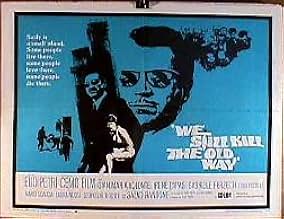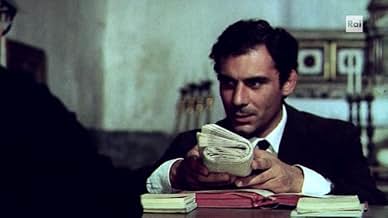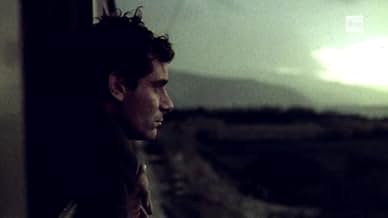IMDb रेटिंग
7.0/10
2 हज़ार
आपकी रेटिंग
अपनी भाषा में प्लॉट जोड़ेंIn Sicily, a leftist professor investigates the "honor killings" of two friends, uncovering a tangled web involving politicians, the Mafia, the Church, and the widow of one of the victims.In Sicily, a leftist professor investigates the "honor killings" of two friends, uncovering a tangled web involving politicians, the Mafia, the Church, and the widow of one of the victims.In Sicily, a leftist professor investigates the "honor killings" of two friends, uncovering a tangled web involving politicians, the Mafia, the Church, and the widow of one of the victims.
- निर्देशक
- लेखक
- स्टार
- पुरस्कार
- 6 जीत और कुल 2 नामांकन
फ़ीचर्ड समीक्षाएं
A left-wing professor stressed by moral doubts (Gian Maria Volonté) has the rather strange idea to try to break the ambiant omerta in order to clear the violent death of two friends, honor issues happening just to conceal quite more material interests. But Sicily and its little folk of mute but watchful characters don't seem ready to accept this kind of trouble. Bound with beauty but ungraspable like the doctor's few disconsolate widow (Irene Papas), the island and its stifling sun know how to subdue the one who dares to upset their immutably established order, between a conspicuous church and an invisible mafia.
Goodish blend of Mafia movie (still pretty much uncharted territory at the time) and political thriller, with a hesitant romance thrown in for good measure; the result is generally absorbing, thanks largely to uniformly excellent performances, gleaming location photography (Sicily, of course) and a wonderful score by the ever-reliable Luis Enrique Bacalov. Heading the cast is Gian Maria Volonte': the film launched the political/social conscience phase of his career after a stint doing Spaghetti Westerns. His character is that of an intellectual loner who finds himself in over his head when he starts probing into the assassination of two friends including philanderer Luigi Pistilli which leads to his falling for the other's wife (Irene Papas). Though the identity of the villain (as ever, an eminent member of the community and far closer to the hero than he envisaged) comes as no real surprise, the investigation involving, among other things, the hushed participation of cleric and senator alike and the disquieting revelations that emerge from it, lends the whole a deeply cynical tone (culminating in the downbeat climax depicting Volonte''s own extreme fate) while cementing the Mafia's reputation as strictly a 'family business'. The Italian DVD includes an interesting half-hour featurette detailing the making and reception of the award-winning film (including the fact that the author of the source novel, Leonardo Sciascia, was dissatisfied with how the script turned out); the interviewees are co-scriptwriter Ugo Pirro, the wife of the late Elio Petri, and composer Bacalov (who is regretful that, given his felicitous working relationship with the director here, the opportunity never arose for another collaboration).
Gian Marie Volonte's got himself into some hot water this time! Doesn't he know that in Sicily, if someone gets murdered, you just keep your trap shut and let whoever the police randomly arrest go to jail?
Luigi Pistilli keeps getting letters telling him he's a dead man, and its making him a bit paranoid. Nevertheless, one morning he says goodbye to his wife, then his lover, and sets off with his friend to go hunting, only to find himself the prey. Two corpses later, we've got a bit Sicilian funeral to go to while the police chat about the people attending, including a well-respected lawyer (Gabriele Ferzetti) who's cousin (Irene Papas) was married to one of the victims, and Gian Marie Volonte, a professor friend of the two who starts poking in places that should not be poked.
Pistilli is generally thought to be the target as he was a bit of a fanny rat and some family members are arrested, but they are all illiterate so how could they cobble together those threatening letters. Volonte also finds that the words in the letter were from a Vatican-based newspaper, which leads him to the priesthood. Oh, and a lot of people are related in this film, so one of the priests is the uncle of Papas and Ferzetti.
It's a formula you'll see a lot of in these films, so it's just as well the lead actors are good! Volonte has the hots for the widow Papas and has to basically restrain himself every times he meets her, while Papas kind of has the hots for him too, leading to all kinds of awkward moments. Volonte is very good at the bookish professor who is just too smart and curious for his own good, while Papas just smoulders as the widow.
It looks absolutely scorching hot in Sicily in this film, and just like Damiano Damiani's Day of the Owl, the island itself is a character, with all the strange culture that lives on its land.
The only let down of the film is that the plot is a bit predictable, but it's by no means a bad film.
Luigi Pistilli keeps getting letters telling him he's a dead man, and its making him a bit paranoid. Nevertheless, one morning he says goodbye to his wife, then his lover, and sets off with his friend to go hunting, only to find himself the prey. Two corpses later, we've got a bit Sicilian funeral to go to while the police chat about the people attending, including a well-respected lawyer (Gabriele Ferzetti) who's cousin (Irene Papas) was married to one of the victims, and Gian Marie Volonte, a professor friend of the two who starts poking in places that should not be poked.
Pistilli is generally thought to be the target as he was a bit of a fanny rat and some family members are arrested, but they are all illiterate so how could they cobble together those threatening letters. Volonte also finds that the words in the letter were from a Vatican-based newspaper, which leads him to the priesthood. Oh, and a lot of people are related in this film, so one of the priests is the uncle of Papas and Ferzetti.
It's a formula you'll see a lot of in these films, so it's just as well the lead actors are good! Volonte has the hots for the widow Papas and has to basically restrain himself every times he meets her, while Papas kind of has the hots for him too, leading to all kinds of awkward moments. Volonte is very good at the bookish professor who is just too smart and curious for his own good, while Papas just smoulders as the widow.
It looks absolutely scorching hot in Sicily in this film, and just like Damiano Damiani's Day of the Owl, the island itself is a character, with all the strange culture that lives on its land.
The only let down of the film is that the plot is a bit predictable, but it's by no means a bad film.
Paolo Laurana is a kind of leftist intellectual who chances to be intrigued by a mysterious double murder in the Sicily of mid Sixties. In his personal detection for murder's instigators, he will run into a plot in which both politicians and mafia racketeers are involved. So curiosity will become a very dangerous affair. Taken from a novel by Leonardo Sciascia (1921-1989), A ciascuno il suo (1967) is a film where high rank acting is at its top. Cast (Gianmaria Volonté, Irene Papas, Gabriele Ferzetti, Salvo Randone, Luigi Pistilli. Mario Scaccia, Leopoldo Trieste) is perfect and well-combined, direction (Elio Petri, 1929-1982) is powerful and impressive. If compared to the novel, Elio Petri's film (written with Ugo Pirro) may seem short of that illuministic pessimism that breathes through Sciascia's books, but Laurana's rationalistic search for truth retains that `bitter taste of intelligence' which is one of the major feature of Sciascia's characters. A key film to understand historical condition of Italy in the Sixties.
This is a good, solid, beautifully photographed crime thriller. My misfortune was to pick this film to watch the night after watching, Illustrious Corpses. Now that Italian political crime thriller made in 1976 and based upon a book by Leonardo Sciascia is a near faultless classic with deep undertones and a broad scope that is simply a joy to watch. This, it turns out, is another film based upon another book by Leonardo Sciascia from 1967. How much more sensible it would have been to watch this one first. The thing is there is nothing wrong with this film except it is also about too easily explained killings that the lead character sets out to investigate and in the process overturns a hornets' nest, but there is much less action, intrigue and politics. Gian Maria Velonte is excellent as the professor who takes it upon himself to get involved when most people seem not to care. Interestingly this was the film that helped to lift this actor into more 'serious' films, after having made many spaghetti westerns, one of the last being face to Face also from 1967 when he also played a professor.
क्या आपको पता है
- ट्रिवियाFilm debut and only film performance of Anna Rivero.
- कनेक्शनEdited into Lo schermo a tre punte (1995)
- साउंडट्रैकPour rêve l'hiver
("A Dream for Winter") (uncredited)
Lyrics by Arthur Rimbaud
Music by Luis Bacalov
Sung by Léo Ferré
टॉप पसंद
रेटिंग देने के लिए साइन-इन करें और वैयक्तिकृत सुझावों के लिए वॉचलिस्ट करें
- How long is We Still Kill the Old Way?Alexa द्वारा संचालित
विवरण
- रिलीज़ की तारीख़
- कंट्री ऑफ़ ओरिजिन
- भाषा
- इस रूप में भी जाना जाता है
- We Still Kill the Old Way
- फ़िल्माने की जगहें
- उत्पादन कंपनी
- IMDbPro पर और कंपनी क्रेडिट देखें
- चलने की अवधि1 घंटा 39 मिनट
- ध्वनि मिश्रण
- पक्ष अनुपात
- 1.85 : 1
इस पेज में योगदान दें
किसी बदलाव का सुझाव दें या अनुपलब्ध कॉन्टेंट जोड़ें



























